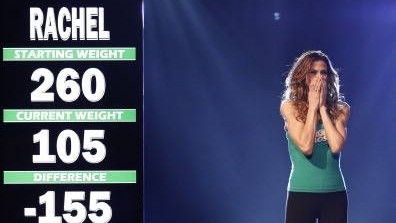
No doubt you've heard the brouhaha surrounding Rachel Frederickson, the winner of this season's The Biggest Loser, who shed 56% of her body weight (a Biggest Loser record), dropping from 260 pounds to a startlingly slim 105. The requisite before and after photos are dramatic--too dramatic, it would seem, because now Frederickson is being slammed for being "too thin". Except the explicit goal of the show is to lose weight.
But if you're Rachel Frederickson, you really can't win, can you? When she was heavier, Frederickson shared how uncomfortable she was in her own skin. Her life was difficult in all the ways you'd expect of a morbidly obese 24-year old. Getting around left her breathless and achy. Her romantic life was nil, and her weight put her at significant risk of diabetes and heart disease. So she threw herself into the competition, insisting that while she ate a healthy 1600 calories a day (under the supervision of a Biggest Loser nutritionist), she exercised for several hours at least four times a day. Not surprisingly, the weight melted away.
Critic and viewers rushed in with their own armchair assessments. She must have an eating disorder! But this very criticism is the raison d'etre of the show itself, which showcases extreme exercise and dieting the way Survivor glorified extreme deprivation. The contestant with the most stamina, the willingness to "do whatever it takes" usually wins. And to the victor go the spoils.
The Biggest Loser is, at its very core, a show about fat shaming. It parades overweight Americans as totems of unhealthy behavior and then incentivizes them to go to absurd and unsustainable lengths to be thin: take a break from your job, live in a house with other people who've committed to nearly identical weight loss goals, enjoy round-the-clock counseling from physicians, nutritionists, and trainers, and enjoy healthy and carefully calibrated food prepared by a chef. How's that for reality television? Is it any wonder that Frederickson would emerge from the experience practically skeletal?
The only surprise is that we haven't seen a contestant this emaciated before now.
In this way, the show also highlights the impossible standards for women, in particular, when it comes to weight. Let's get real: If a man had won, with his ribcage protruding as Frederickson's did, would there be such an outcry about anorexia? Seems unlikely. But for women, there's a much narrower bandwidth of acceptable weight. Fall outside those metrics, on either side, and prepare for some fallout. If we've learned anything from the latest Biggest Loser flap it's that being too thin is as fraught and despised a state as being too fat. Good luck finding the middle ground.
Meredith Fineman is the founder of FinePoint PR. You can read more of her writing here.
Stay In The Know
Marie Claire email subscribers get intel on fashion and beauty trends, hot-off-the-press celebrity news, and more. Sign up here.
-
 Heidi Gardner Opens Up About Viral Moment She Broke Character During ‘Saturday Night Live’ Beavis and Butt-Head Sketch
Heidi Gardner Opens Up About Viral Moment She Broke Character During ‘Saturday Night Live’ Beavis and Butt-Head Sketch“I just couldn’t prepare for what I saw.”
By Rachel Burchfield Published
-
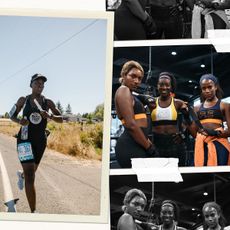 Fashion, Family, Fitness: The 3 Guiding Principles of 'MC' Editor-in-Chief Nikki Ogunnaike and How They Intersect in Her Life
Fashion, Family, Fitness: The 3 Guiding Principles of 'MC' Editor-in-Chief Nikki Ogunnaike and How They Intersect in Her LifeBy Nikki Ogunnaike Published
-
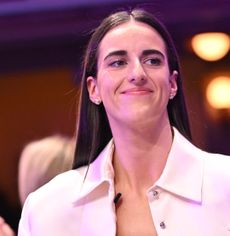 Caitlin Clark's WNBA Draft Glow Is Courtesy of Glossier
Caitlin Clark's WNBA Draft Glow Is Courtesy of GlossierShe even wore a just-launched product from the brand.
By Julia Marzovilla Published
-
 The Best Bollywood Movies of 2023 (So Far)
The Best Bollywood Movies of 2023 (So Far)Including one that just might fill the Riverdale-shaped hole in your heart.
By Andrea Park Published
-
 ‘Bachelor in Paradise’ 2023: Everything We Know
‘Bachelor in Paradise’ 2023: Everything We KnowCue up Mike Reno and Ann Wilson’s “Almost Paradise."
By Andrea Park Last updated
-
 Who Is Gerry Turner, the ‘Golden Bachelor’?
Who Is Gerry Turner, the ‘Golden Bachelor’?The Indiana native is the first senior citizen to join Bachelor Nation.
By Andrea Park Last updated
-
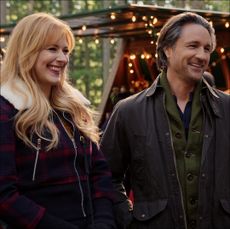 ‘Virgin River’ Season 6: Everything We Know
‘Virgin River’ Season 6: Everything We KnowHere's everything we know on the upcoming episodes.
By Andrea Park Last updated
-
 The 60 Best Musical Movies of All Time
The 60 Best Musical Movies of All TimeAll the dance numbers! All the show tunes!
By Amanda Mitchell Last updated
-
 'Ginny & Georgia' Season 2: Everything We Know
'Ginny & Georgia' Season 2: Everything We KnowNetflix owes us answers after that ending.
By Zoe Guy Last updated
-
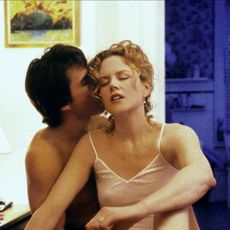 35 Nude Movies With Porn-Level Nudity
35 Nude Movies With Porn-Level NudityLots of steamy nudity ahead.
By Kayleigh Roberts Last updated
-
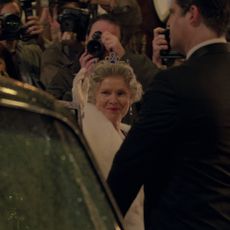 The Cast of 'The Crown' Season 5: Your Guide
The Cast of 'The Crown' Season 5: Your GuideThe Mountbatten-Windsors have been recast—again.
By Andrea Park Published